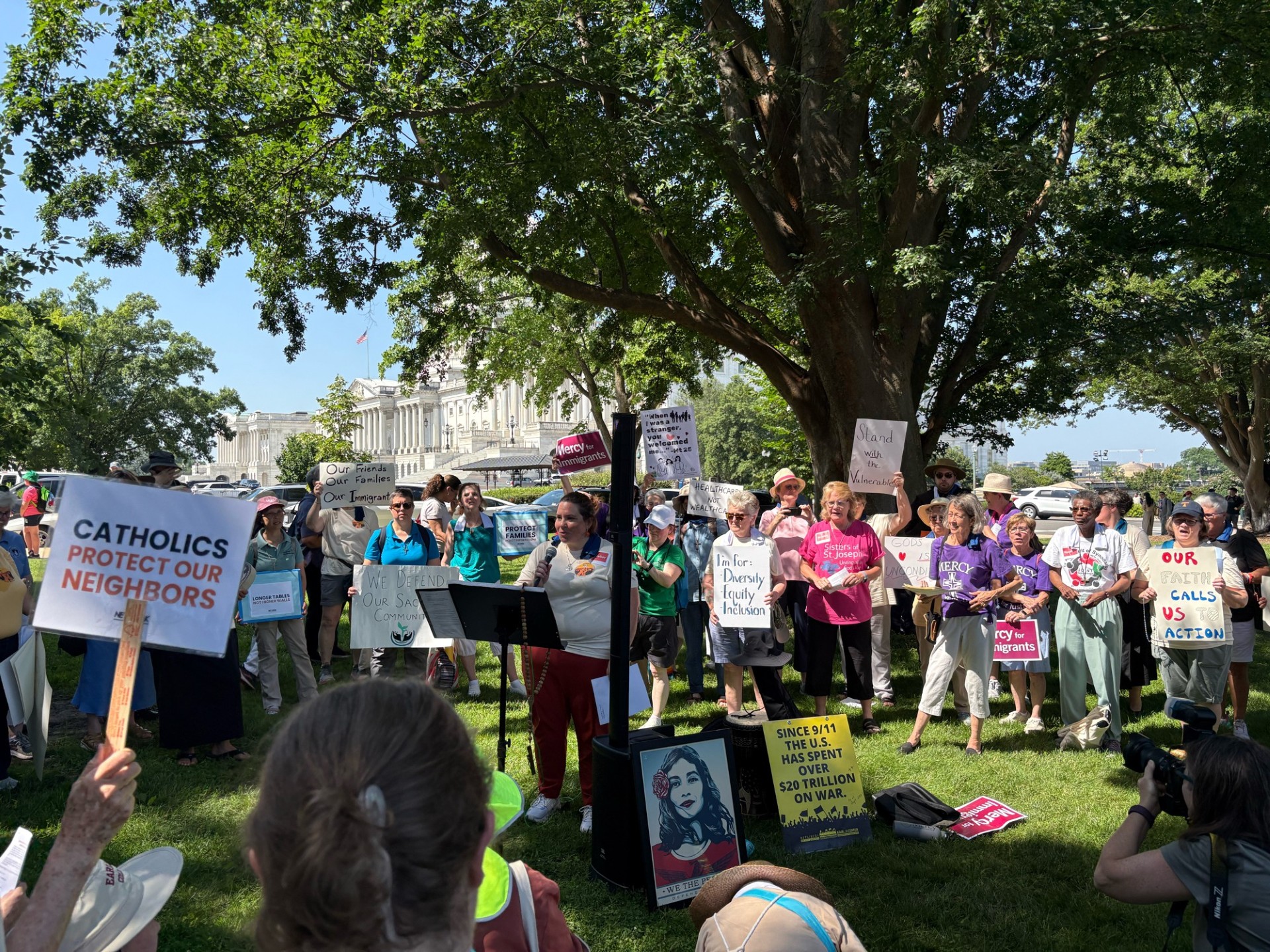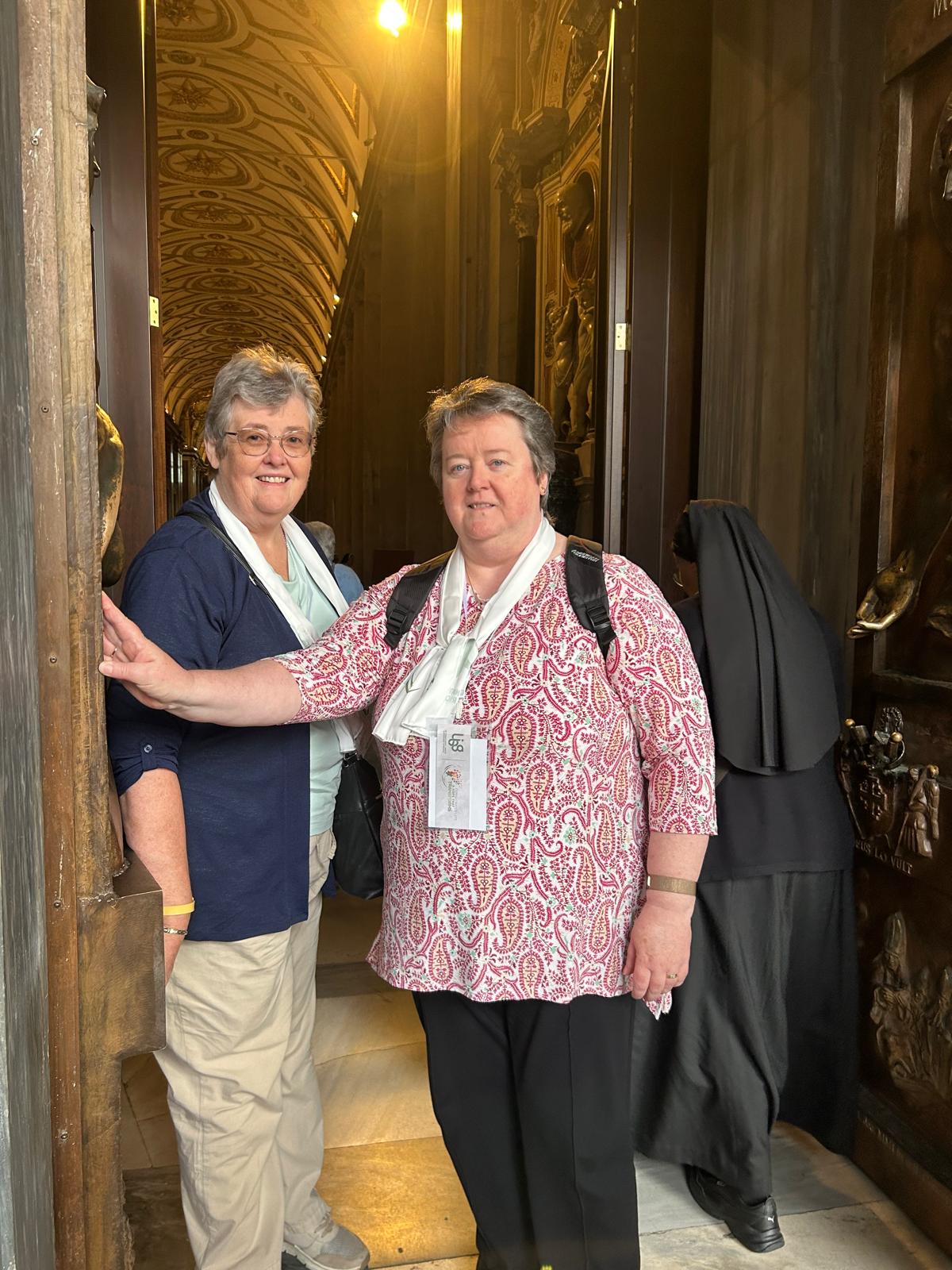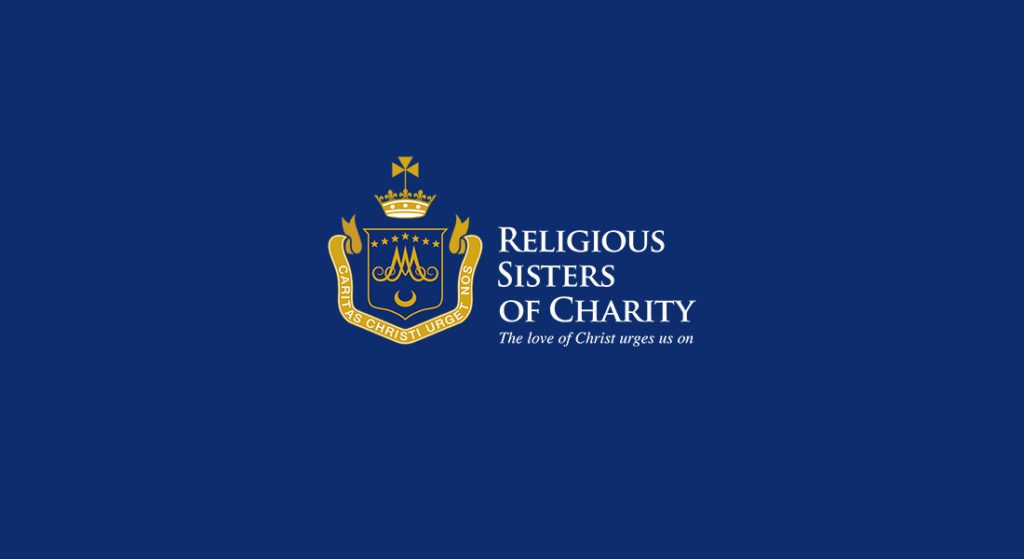
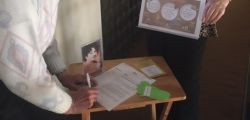 We can be powerful agents of change for those made poor. In the spirit of Mary Aikenhead we ask these questions. What issues or situations are we passionate about? As RSC’s we are called to be passionate about the poor. That passion is fuelled by our daily quiet, contemplative prayer that hears the cry of the poor.
We can be powerful agents of change for those made poor. In the spirit of Mary Aikenhead we ask these questions. What issues or situations are we passionate about? As RSC’s we are called to be passionate about the poor. That passion is fuelled by our daily quiet, contemplative prayer that hears the cry of the poor.
Our prayer moves us to want to do something. The power and influence of the Ignatian conversation is one form of advocacy to help people move out of prejudice, bigotry and fear. In the spirit of our charism, with the resources we have and access to media, we can use our computers, our voices, our pens and phones to advocate for others. On November 5th we did just that in training on Advocacy.
The Congregational Anti Human Trafficking Team met in Dublin in 2015, and developed a strategy for the next three years. One strategic effort was to educate and empower our sisters and our collaborators in advocacy and capacity building. On November 5th the Regional Human Trafficking team in California offered a day on Advocacy. Sr. Michelle Hetherington opened the day reminding us of our Chapter statement and vision and led us in prayer using a spoken word video about Syrian Refugees called ‘What They Took With Them’. It is a poem by Jenifer Toksvig. Jenifer was inspired by stories and first-hand testimonies from refugees forced to flee their homes and items they took with them. The poem can be viewed on the UNHCR website by clicking HERE.
We then joined in a prayer, “Soften My Heart” by Edwina Gately and made a commitment to stand with Refugees.
Sister Bernadette Moran and Sylvia Valdez presented the Spirituality of Advocacy. Quoting Mother Teresa, Bernadette spoke about how God uses us, “I am a pencil in God’s hand.” Sisters pondered what kind of pencil they were! Sharp? Blunt? Sisters shared about a time in which they knew that they were really God’s pencil. Bernadette reflected on the little boy in the Gospel of Matthew (Multiplication of the Loaves) who shared his lunch. Jesus had the apostles distribute food and by the generous act of sharing what he had, a large number of people were fed. So with us, if we share what we have no matter what or how much, the result is wonderful
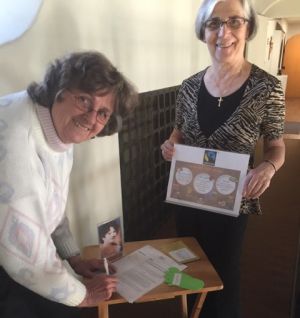 The question Bernadette shared was “For whom do we shed a tear?” We look to the needs of the world and offer a prayer. On the local level, we listen with a sympathetic ear to a community member, a neighbor etc.
The question Bernadette shared was “For whom do we shed a tear?” We look to the needs of the world and offer a prayer. On the local level, we listen with a sympathetic ear to a community member, a neighbor etc.
This was followed with time for personal reflection. Sylvia shared the impact of our sisters at work in Nigeria, Malawi and California. We were graced to get her perspective as a lay woman about how God uses us for those made poor.
The second half of the meeting was experiential and educational as sisters moved between tables, each labeled with a different social justice issue. There were choices and instruction about how to advocate regarding that issue. As each sister moved around different stations, she engaged with a social issue as an advocate by signing online petitions, making a phone call, signing a hard copy letter, a postcard and collecting information.
We signed a letter urging our leaders to halt all executions and abolish the death penalty. We advocated for Clean Power and a National Standard of carbon emissions. We signed postcards for the Human Thread campaign challenging department stores to develop clothing, which pays a just wage to those who make our clothes.
Our sisters made phone calls urging our leaders to develop humane border policies standing with the immigrants. We signed a petition demanding access to Education for Refugees.
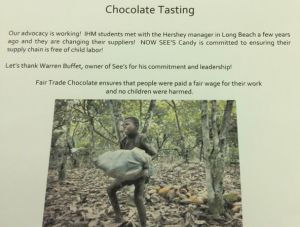 The Good News was that one of our favourite chocolates, Mama See’s Candy, had just moved into compliance with our supply transparency law ensuring that no child labor is used in the production of their chocolates. We had written a letter to this company three years ago, so we all signed one hard copy letter to the owner, Warren Buffet, thanking him for this social action and responsibility. We had a Fair Trade table with items that Sylvia Valdez provided along with a bar of fair trade chocolate for each sister.
The Good News was that one of our favourite chocolates, Mama See’s Candy, had just moved into compliance with our supply transparency law ensuring that no child labor is used in the production of their chocolates. We had written a letter to this company three years ago, so we all signed one hard copy letter to the owner, Warren Buffet, thanking him for this social action and responsibility. We had a Fair Trade table with items that Sylvia Valdez provided along with a bar of fair trade chocolate for each sister.
Sr. Anne Giblin gave a very moving testimony about her advocacy with the Moslem community. The project Anne got involved with was the Islamic, Jewish and Christian response to the War in Bosnia during the 90’s. The City of Los Angeles participated by sending a representation to support the cause. Anne was the only Christian representative. Meetings were held at the Islamic Center on Vermont in LA. A variety of events were planned.
The group contacted Senators Boxer and Feinstein. Thousands of postcards were mailed to the two CA senators in Washington. As a result of her participation the cause made its way into the Congressional Record.
One or two large protests took place at the Federal Building in Westwood. There was also a news conference at the Islamic Center. The four major groups at the center of the cause were represented. On several occasions, the leadership of the Islamic Center warned the participants not to congregate in front of the Center because of threats from unknown persons. A major Muslim supporter paid $35,000 to highlight the cause in a full page Advertisement in the LA Times.
Anne shared some important learnings from her experience that it is important to organize large groups that cross ethnicity, religious beliefs and social levels. It is not necessary that everyone speak at meetings or news conferences but it is vital that there be a few strong persons who can step forward and defend the cause – only one person spoke for the cause at the news conferences. Others demonstrated support from their respective groups by simply being present on the stage.
Anne shared how impressed she was with the freedom and ability of the Muslim women to organize, speak and defend their cause with conviction. They were very gentle women.
No single group could have achieved what they set out to do – highlighting the cause of the Muslim people who were being slaughtered in Bosnia-Herzogovenia at the time. The meetings were emotional. Collaboration was evident at every meeting. Religious beliefs were not discussed at the public forums. Human rights and the protection of children were underscored at every meeting.
Anne also shared an experience of being an advocate for a woman she observed being abused by police late and night. After contacting a lawyer and working with the police department through several interviews, Anne’s testimony was affirmed by the police officer and acknowledged as very credible. Anne said, “It took months of sleepless nights and fear to report the event but the lawyer said that if I did not report it I would be condoning abuse. I felt very relieved and lightness filled my body once I had done it. The woman was homeless and slunk away like a dog that had been kicked.”
Being an advocate in these situations can be frightening especially when dealing with the powerful. Anne’s advocacy involved more than signing a petition and was a good learning model for us all.
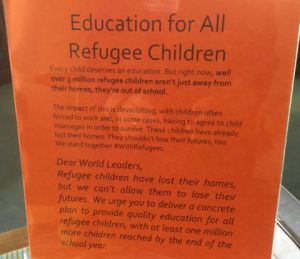 Being an advocate is about being sensitive to the signs of the times, listening to the news and to people we know struggling to live on a minimum wage, immigrants living in fear that they will be deported, Moslems anxious they will be targeted and those sitting on death row waiting and not knowing when or if they will be executed.
Being an advocate is about being sensitive to the signs of the times, listening to the news and to people we know struggling to live on a minimum wage, immigrants living in fear that they will be deported, Moslems anxious they will be targeted and those sitting on death row waiting and not knowing when or if they will be executed.
Being an advocate is also about being a prayerful intercessor, which any one of us can do. At a regional meeting a couple years ago, we remembered each receiving the name of a specific Nigerian girl from Chibok who had been abducted. During the rescue of some girls last month, we noted with great joy that some of ours were freed using the names from an Internet site.
We gathered up our learnings in a general sharing and closed with a prayer in which two sisters read some of the names of the 748 people sitting on death row in California waiting to be executed. While the names were read, we sang “Jesus, remember me.” We then ended the day with a hopeful video with messages of peace that you can enjoy here:

